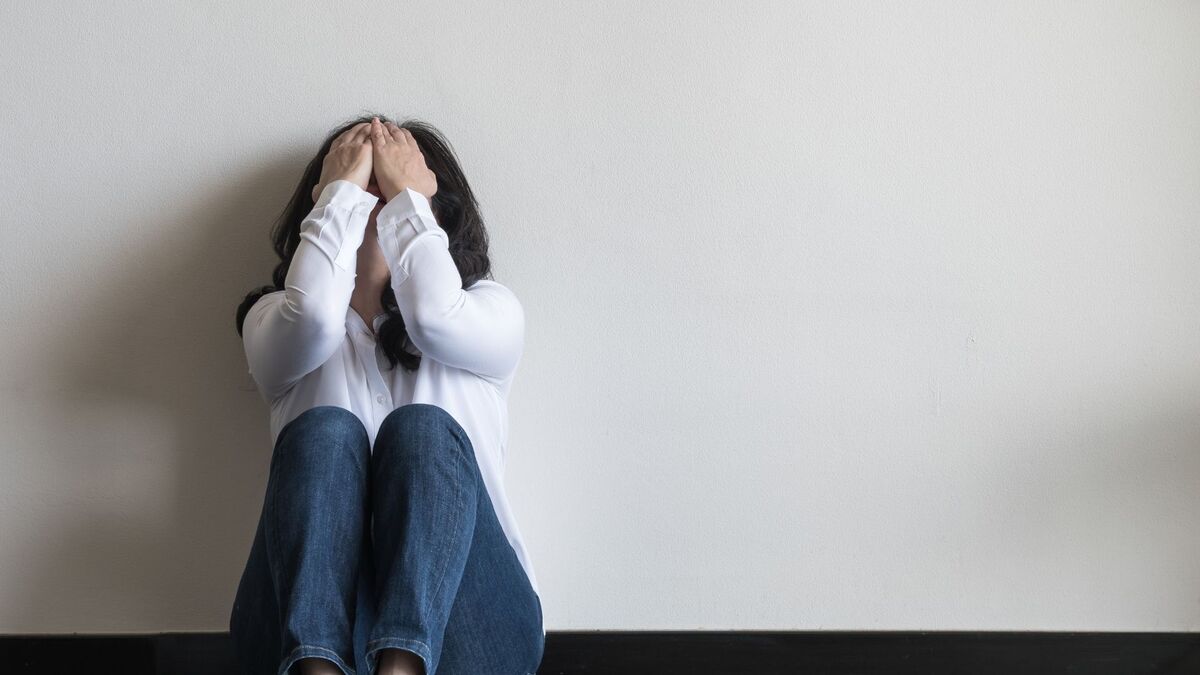Table of contents
Find out more about the types of anxiety and their treatments!

Anxiety is portrayed through fear and danger of the unknown, and varies according to its intensity and purpose. Thus, there is generalized anxiety disorder, obsessive compulsive disorder, post-traumatic stress disorder, social phobia, among others.
When formulated in an exaggerated way, it becomes a pathological problem, which can damage quality of life. Identification is the first step in trying to alleviate it, which also includes selective mutism, agoraphobia, panic disorder and separation anxiety disorder.
Depending on the symptoms, severity and needs, each person may have an indication for treatment. Psychotherapy in conjunction with medication can be an alternative, for example, anxiolytics or antidepressants.
Now, read on to understand the types of anxiety and their treatments!
Understanding anxiety

It is possible to delve into other characteristics of anxiety, considering its definitions, symptoms, main causes, etc. Each individual acts differently in stressful situations, and this feeling develops at some point in life.
It can be due to worry, nervousness, fear and much more. Some become persistent and excessive, consuming more and more. It is important to take some precautions, especially to differentiate between the respective situations. Therefore, analyzing the differentiation between worry, stress and anxiety.
All these emotions can change your daily routine, becoming chronic or not. This information acts according to the brain's reaction to alert you, containing the essential need to pay attention to the danger you may face ahead.
Read on to find out more about anxiety!
What is anxiety?
Given temporary, natural or normal situations, anxiety is also what causes stress. Using examples of a job interview, public presentation, even a school or college exam, a person can begin to suffer in advance.
The intense feeling can affect other factors of everyday life, arising for no concrete or apparent reason. Normality comes with this feeling developing from time to time, especially with important events. Fear of the unknown can affect, but depending on the frequency it is important to be alert.
Main causes of anxiety
The onset of anxiety can be transformed into factors linked to a family history of people with this problem, exposure to stress, negative feelings, as well as another health condition that can trigger it even more.
Chronic pain is also a cause, as are heart problems and changes in the thyroid gland. The trauma of a circumstance can lead to physical or verbal violence, including those who want to get rid of their addiction to drugs or alcohol. In this sense, withdrawal can set in, causing addiction.
Symptoms of anxiety
Anxiety can also develop into many other symptoms, all of which make the situation increasingly complicated, including restlessness, panic, agitation, worry, excessive fear, irritability, daydreaming and fear of danger.
Other problems include shortness of breath or wheezing, and difficulty sleeping and resting. Stomach pains can appear, along with an accelerated heartbeat, muscle tension, trembling and insomnia.
Dangers and precautions with anxiety
Feeling anxious may be normal, but it's important to take precautions against its dangers, so watch out for persistence, including lack of control, by making an appointment with a suitable specialist and following all the prescriptions.
This is where a psychiatrist can make a difference, taking into account everything you're going through and whether all your emotions are getting in the way of your performance at work or college, and adding suicidal thoughts and behaviors.
Difference between anxiety, stress and worry
With differences between anxiety, stress and worry, the first condition presents external fear, mainly of simple everyday situations. Following the context, stress is what a person may feel as a threat, developing aggressive defenses.
As for the processes of worry, they are related to something, such as a close person who is ill, for example. There can also be a certain obsession with the future, with a view to whether or not they will be able to carry out a certain activity.
Types of anxiety

In terms of distinctions, anxiety can be seen as the generalized kind that causes a certain amount of worry and tension, mainly without concrete reasons. As for panic disorder, it is intense and sudden fear. Compulsive anxiety brings up images, ideals that can be recurrent, persistent.
In addition to social phobia, agoraphobia, selective mutism, post-traumatic stress disorder and separation anxiety, the first is a feeling that affects all social situations, such as the fear of going out with friends. Agoraphobia is the fear of leaving the house alone, of being in open spaces.
Defining selective mutism, it portrays a child who speaks normally with their family, but not at school. Containing post-traumatic, it presents situations that have affected them, whether it be a kidnapping or an assault. Separation also talks about children, where they have been through a situation with someone who has left.
Read on to find out more about the types of anxiety!
Generalized anxiety disorder
Generalized anxiety disorder highlights excessive worry, especially when it is complicated to handle. In addition, this issue talks about spending a lot of time thinking about and dwelling on situations, moments, circumstances.
They also mean thoughts of the future, which are about how things will unfold and how each person copes. These symptoms are not uncommon, given the inability to explain the reasons for them. Most of the time, these people experience all of these symptoms, and they intensify more and more.
Panic disorder
The recurrence of panic disorder is presented as a worrying warning, and physical symptoms can appear. The unexpected can also be constituted, with shortness of breath, chest pain, trembling. A dissociated individual can have a feeling of imminent destruction.
Panic disorder can vary, but on average lasts less than 20 minutes and causes sweating and dizziness. All the symptoms described are worrying, stressful and uncomfortable, which is why a specialist doctor should be contacted.
Obsessive compulsive disorder
Obsessive Compulsive Disorder is determined by thoughts that are difficult to control. Repetition also highlights the preoccupation with things that are not in order. Feelings of aggression can arise, especially in relation to others.
Managing emotions is a difficult task, with examples about taboos, violence, sex and religion. Another example is the way a person does the same action over and over again. Checking whether they have closed a door or not, counting other things.
Post-traumatic stress disorder
Hinting at something that happened in the past, post-traumatic stress disorder speaks of a long-term condition that can give many other symptoms and for many years. When there is no treatment it can get worse, presenting some things within 3 months or so.
It also serves as a reliable source of an incident, with specific cases only appearing later. Flashbacks, nightmares, anxieties, tensions can arise, as well as frightening thoughts. Difficulty sleeping, anger for no apparent reason, changing the routine for triggers that make you remember.
Social phobia
Social phobia can be characterized by a psychological disorder that presents anxiety and excessive fear, situations that could be constituted in a negative way, evaluating what a certain person might think, including performance in something.
Making a presentation in public, a meeting with strangers and even eating in front of others - this can also be caused by a job interview, containing a lecture, interfering with personal life, day-to-day life, as well as professional and family life.
Agoraphobia
Generally occurring as a response to panic attacks, agoraphobia is about extreme fear and anxiety, such as an attack or fear of what might happen in a specific place, usually outside the home.
By avoiding the place, a person is confined to their home, avoiding any possibility of something bad happening where they are. In addition, they have no possibility of asking for help or assistance. In this sense, the individual will avoid certain situations or places in every way.
Separation anxiety disorder
This definition of separation anxiety disorder is about young children who become frightened or anxious when a loved one leaves. Not only that, but anyone can develop these stressful, worrying symptoms.
In addition to formulating his fears, he also portrays a close person who has gone out of his sight. Always worrying, he thinks of many possibilities that something bad could happen to someone he loves and who is important to his life.
Selective mutism
Rare as it is, this selective mutism disorder can be built up in childhood, causing a child to have fear and difficulty speaking to people other than those they live with. In other words, running away from relatives, people who aren't their siblings or parents.
Between the ages of 3 and 6, it can be seen as shy behavior, which does not make the child comfortable, but also defines constant refusals and failure to articulate words. This can still develop into a lot of suffering, not to mention for those around them.
Further information on types of anxiety

Containing other information that can add up all the characteristics of anxiety, its levels which can be worrying, assessments, diagnoses, treatments and others. Also being able to avoid certain situations, an anxious person can trigger worrying symptoms.
In addition, there is the possibility of living in a more restricted system, such as not leaving the house or on the street. Natural or non-natural remedies are indicated for some patients, and psychotherapy can also help. Some systems can help prevent symptoms or relieve them.
Excessive worrying can also lead to isolation, ending up doing nothing at all and blaming yourself for it. Intense worrying can even lead to other signs of depression. Read on to find out more about anxiety!
When is anxiety a concern?
Concern about anxiety should be related to its intensity, especially if it affects routine performance. It can also give rise to psychological and physical reactions, such as tremors, dizziness, tachycardia, insomnia, etc.
Therefore, missing important appointments can be one way in which it manifests itself, with all these formulations being processes that need to be assessed by a doctor. Reflexes can also be those that cause shortness of breath, stuttering and fainting.
How is anxiety assessed and diagnosed?
The diagnosis and assessment of anxiety are processes that only a specialist mental health doctor can determine, i.e. with criteria based on their studies, mainly to recommend a treatment plan for the patient.
It can be a long, physical examination, as well as an interview with the family history. Tests may be indicated, given all the information he can obtain. Generally, they are those that make an assessment, containing one to portray the intensity, as well as an inventory to find out about the social phobia.
Treatments for anxiety
Treatments for anxiety encompass psychotherapy processes, with or without natural remedies. Specific actions can be determined, such as exposure, interpersonal, acceptance, commitment and psychodynamic therapy.
Depending on the individual, the specialist will need to indicate their prescriptions, which will not be useful for someone else. Contacting a doctor should never be ruled out, because only he or she will do what is right for you at the time.
Psychotherapy
Psychotherapy or talk therapy is a treatment that can provide new conditions for a person's mental health. Here not only anxiety can be treated, but also depression, psychological variations and emotional problems. Symptoms can be reduced, and they can also be eliminated.
Generally, these worrying emotions can be dealt with with the help of a professional in the therapeutic system, a counselor, adding a psychologist, psychiatrist and even a social worker. There are various formulas in this context, and the determination must come from the specialist.
Medicines
The antidepressants indicated for the treatment of anxiety are those capable of alleviating it, as well as anxiolytics. These are pharmacological formulations, with a view to processes that can be combated. For this reason, selective inhibitors can be indicated for the application of serotonin.
There's sertraline, citalopram, escitalopram and fluoxetine. The tricyclics are: clomipramine, imipramine. There's also the possibility of including alprazolam, diazepam, lorazepam. The blockers add propranolol and metoprolol tartrate. So it can vary according to the diagnosis.
Natural treatments
Natural treatments for anxiety can be varied, mainly down to each individual's choice, so physical exercise is one option, and can be similar to medication. It can be used to relieve, alleviate or treat anxiety. Meditation is an effective way of controlling the mind and thoughts.
With alcohol being a natural sedative, it serves as an anxiolytic. In this system, drinking a glass of wine or a small amount of whisky can help to calm you down. Deep breathing can help, with the restoration serving as a pattern for action and as a natural remedy.
What can you do to prevent anxiety?
The prevention of anxiety can be based on organizing tasks in advance, not putting too much pressure on yourself and doing things in stages. In this system, a substance such as caffeine can be harmful, so avoid consuming it or eliminate it altogether. Even if the anxiety is not intense, contacting a doctor is essential.
Everyone should go to therapy, not just those who are trying to cope with heightened emotions. The use of medication is one way of preventing this, but only if prescribed by a specialist. Follow-up is essential and can help you manage your feelings.
How to relieve an anxiety attack?
Going through an anxiety crisis is a complicated system, but there are processes to alleviate it. It's important to know these methods, in view of the support you can get, so try to divert your attention from the symptoms and avoid worrying in advance.
Tightening the muscles during a crisis serves as a defense, but they must remain relaxed, so once your breathing is under control, begin the process of muscle relaxation. Another way out is to reduce the intensity of your thoughts by setting up distractions, i.e. talking to someone and paying attention only to them.
Keep an eye on your anxiety levels and see a doctor if necessary!

There isn't necessarily a specific cure for anxiety, but it can be treated by seeing a specialist doctor. Therefore, it's important to first carry out your own assessment, analyzing the symptoms, processes and circumstances, especially if you feel the need. Managing these feelings may not be an easy task, requiring combinations and approaches to alleviate them.
Medications are included depending on the situation, with a doctor's prescription and tests to prove and determine the level. Psychotherapy is common, including anxiolytics and antidepressants. Lifestyle changes can make a difference, especially with the inclusion of physical activities that are relaxing and provide the comfort that is being sought.
This uncomfortable feeling is directly linked to worry, as well as intense fear. Despite this, it's a reaction of the human body, but it can turn into a disorder. Day-to-day life can be affected, changing all purposes, hindering developments and perspectives. Don't hesitate to seek out an appropriate professional.

